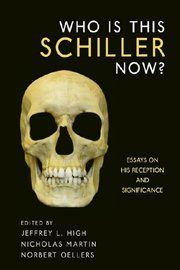Book contents
- Frontmatter
- Contents
- Foreword
- Acknowledgments
- List of Abbreviations
- Introduction: Why Is This Schiller [Still] in the United States?
- Part I Schiller, Drama, and Poetry
- Part II Schiller, Aesthetics, and Philosophy
- Part III Schiller, History, and Politics
- Part IV Schiller Reception — Reception and Schiller
- 17 Schiller and the Gothic — Reception and Reality
- 18 Schiller's Plays on the British Stage, 1797–1825
- 19 From Martyr to Vampire: The Figure of Mary Stuart in Drama from Vondel to Swinburne
- 20 A Chapter of Schiller in America: The First World War and Volume 3 of Kuno Francke's Edition of The German Classics
- 21 The Reluctant Recruit? Schiller in the Trenches, 1914–1918
- 22 Schiller — Kommerell — George. Eine Konstellation der Moderne
- 23 Was sagte dieser Schiller (damals)? Schillers Antworten auf seine Kritiker nach 1945
- Part V Schiller Now
- Notes on the Contributors
- Index
21 - The Reluctant Recruit? Schiller in the Trenches, 1914–1918
from Part IV - Schiller Reception — Reception and Schiller
Published online by Cambridge University Press: 05 February 2013
- Frontmatter
- Contents
- Foreword
- Acknowledgments
- List of Abbreviations
- Introduction: Why Is This Schiller [Still] in the United States?
- Part I Schiller, Drama, and Poetry
- Part II Schiller, Aesthetics, and Philosophy
- Part III Schiller, History, and Politics
- Part IV Schiller Reception — Reception and Schiller
- 17 Schiller and the Gothic — Reception and Reality
- 18 Schiller's Plays on the British Stage, 1797–1825
- 19 From Martyr to Vampire: The Figure of Mary Stuart in Drama from Vondel to Swinburne
- 20 A Chapter of Schiller in America: The First World War and Volume 3 of Kuno Francke's Edition of The German Classics
- 21 The Reluctant Recruit? Schiller in the Trenches, 1914–1918
- 22 Schiller — Kommerell — George. Eine Konstellation der Moderne
- 23 Was sagte dieser Schiller (damals)? Schillers Antworten auf seine Kritiker nach 1945
- Part V Schiller Now
- Notes on the Contributors
- Index
Summary
The essay examines the use and abuse of Schiller in the so-called “Krieg der Geister” (war of the intellectuals) between British and German academics and cultural figures during the First World War. The “Krieg der Geister” largely supplanted the generally productive spirit of intellectual and academic cooperation that had existed between Britain and Germany for many decades before 1914. The war rapidly came to be defined by intellectuals in both nations as a contest in which competing moral and cultural values were at stake between the belligerent states. In their efforts to define and defend these values, intellectuals on both sides shamelessly invoked their respective cultural traditions. This essay will sketch the role of imaginative interpretations of Schiller's character and works in the process of mobilizing culture in order to bolster the war effort and boost morale at the front.
WHEN HE WAS DIRECTOR of the Defense Studies Program at Harvard in the 1960s, Henry Kissinger is said to have remarked that “academic politics are so vicious precisely because the stakes are so low.” Academics are, of course, no less capable of viciousness when the political stakes are high; and rarely, in Britain and Germany at least, have the stakes been higher than they were in 1914. The outbreak of the First World War saw the academic and cultural communities of two civilized nations turn on each other in an unprecedented spirit of mutual hostility.
- Type
- Chapter
- Information
- Who Is This Schiller Now?Essays on his Reception and Significance, pp. 351 - 366Publisher: Boydell & BrewerPrint publication year: 2011



